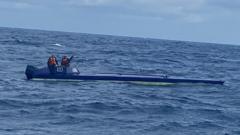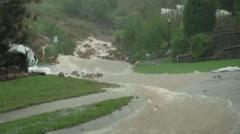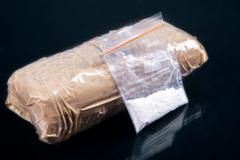The Colombian Navy has intercepted a semi-submersible vessel equipped to transport cocaine directly to Australia, marking the emergence of a new and lucrative drug smuggling route. This interception is part of a larger multinational operation that has led to significant arrests and drug seizures linked to organized crime networks.
Colombian Navy Discovers New Drug Route to Australia via Semi-Submersibles

Colombian Navy Discovers New Drug Route to Australia via Semi-Submersibles
A recent interception of a cocaine-laden semi-submersible in the Pacific reveals a new maritime smuggling route from Colombia to Australia, with authorities uncovering alarming trends in international drug trafficking.
The Colombian navy has made a significant breakthrough in the war on drugs, intercepting a semi-submersible vessel that was reportedly en route to Australia packed with cocaine. This discovery highlights a new maritime smuggling route, as the vessel had enough fuel to make the lengthy journey, suggesting a coordinated effort by drug trafficking gangs to expand their operations to Australia, where cocaine prices are markedly higher than in the U.S.
Authorities noted that a kilogram of cocaine can command prices as high as $240,000 (£190,000) in Australia—approximately six times the amount in the U.S. This lucrative market has now attracted the attention of South American smuggling networks, leading to a concerning trend in drug trafficking.
The semi-submersible was intercepted about 1,200 miles southwest of Clipperton Island, an uninhabited French coral atoll. It is believed to have originated from the Colombian port of Tumaco, traveling thousands of miles across the Pacific Ocean before being halted by the navy.
Vice-Admiral Orlando Enrique Grisales, head of naval operations for the Colombian Navy, disclosed that this interception marks the third semi-submersible seized in the region, confirming suspicions of a well-established smuggling route directly to Australia. He indicated that the maps found on board provided crucial insights into the route, prompting collaboration with Australian authorities.
This operation is part of "Orion," an extensive multinational naval effort engaging numerous countries that has seized a staggering 225 tonnes of cocaine over six weeks and led to over 400 arrests globally. Vice-Admiral Grisales emphasized that the Orion investigation had shed light on direct connections between drug trafficking organizations in South America and Oceania.
Colombian President Gustavo Petro commended the navy's successful endeavors, while the situation serves as a reminder of the growing international implications of the global drug trade. With Australians leading the world in per capita cocaine usage, followed closely by the British according to OECD reports, the case illustrates the ongoing battle against drug trafficking and its transnational impact.




















